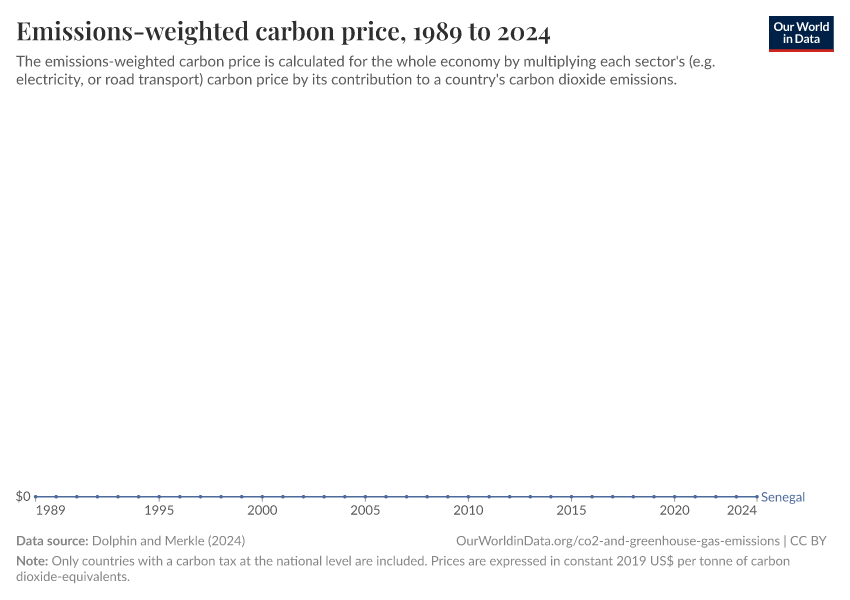Emissions-weighted carbon price

What you should know about this indicator
- This data primarily focuses on economic instruments targeting carbon dioxide (CO₂) emissions.
- In some cases these instruments also cover other greenhouse gases. However, any pricing mechanisms that specifically target non-CO₂ gases (such as methane or nitrous oxide) are not included.
- A country is considered to have a carbon tax or emissions trading system if at least one IPCC sector or gas is covered by the instrument. These instruments do not need to cover all sectors within the economy for this to apply.
- Only countries with a carbon tax at the national level are included.
- For each country, researchers calculate an emissions-weighted carbon price for the economy. To do this, they rely on two metrics:
- Carbon prices applied at the sectoral level (e.g. electricity, or road transport).
- Each sector's contribution to a country's CO₂ emissions (e.g. what percentage of a country's emissions come from electricity, or road transport). They then weight each sector's carbon price by the relevant sector's contribution to CO₂ emissions, and aggregate these figures to get an economy-wide weighted carbon price.
- A full technical note on the methodology is provided by the authors in this report.
Related research and writing
What you should know about this indicator
- This data primarily focuses on economic instruments targeting carbon dioxide (CO₂) emissions.
- In some cases these instruments also cover other greenhouse gases. However, any pricing mechanisms that specifically target non-CO₂ gases (such as methane or nitrous oxide) are not included.
- A country is considered to have a carbon tax or emissions trading system if at least one IPCC sector or gas is covered by the instrument. These instruments do not need to cover all sectors within the economy for this to apply.
- Only countries with a carbon tax at the national level are included.
- For each country, researchers calculate an emissions-weighted carbon price for the economy. To do this, they rely on two metrics:
- Carbon prices applied at the sectoral level (e.g. electricity, or road transport).
- Each sector's contribution to a country's CO₂ emissions (e.g. what percentage of a country's emissions come from electricity, or road transport). They then weight each sector's carbon price by the relevant sector's contribution to CO₂ emissions, and aggregate these figures to get an economy-wide weighted carbon price.
- A full technical note on the methodology is provided by the authors in this report.
Sources and processing
This data is based on the following sources
How we process data at Our World in Data
All data and visualizations on Our World in Data rely on data sourced from one or several original data providers. Preparing this original data involves several processing steps. Depending on the data, this can include standardizing country names and world region definitions, converting units, calculating derived indicators such as per capita measures, as well as adding or adapting metadata such as the name or the description given to an indicator.
At the link below you can find a detailed description of the structure of our data pipeline, including links to all the code used to prepare data across Our World in Data.
Reuse this work
- All data produced by third-party providers and made available by Our World in Data are subject to the license terms from the original providers. Our work would not be possible without the data providers we rely on, so we ask you to always cite them appropriately (see below). This is crucial to allow data providers to continue doing their work, enhancing, maintaining and updating valuable data.
- All data, visualizations, and code produced by Our World in Data are completely open access under the Creative Commons BY license. You have the permission to use, distribute, and reproduce these in any medium, provided the source and authors are credited.
Citations
How to cite this page
To cite this page overall, including any descriptions, FAQs or explanations of the data authored by Our World in Data, please use the following citation:
“Data Page: Emissions-weighted carbon price”, part of the following publication: Hannah Ritchie, Pablo Rosado, and Max Roser (2023) - “CO₂ and Greenhouse Gas Emissions”. Data adapted from Resources for the Future. Retrieved from https://archive.ourworldindata.org/20250909-093708/grapher/emissions-weighted-carbon-price.html [online resource] (archived on September 9, 2025).How to cite this data
In-line citationIf you have limited space (e.g. in data visualizations), you can use this abbreviated in-line citation:
Dolphin and Merkle (2024) – with minor processing by Our World in DataFull citation
Dolphin and Merkle (2024) – with minor processing by Our World in Data. “Emissions-weighted carbon price” [dataset]. Resources for the Future, “Emissions-weighted Carbon Price” [original data]. Retrieved January 15, 2026 from https://archive.ourworldindata.org/20250909-093708/grapher/emissions-weighted-carbon-price.html (archived on September 9, 2025).